Why Do Schools Block Everything on the Internet?

Why Do Schools Block Everything on the Internet?
You have protected your kids from inappropriate sites at your home, but ever wondered if they are safe online at their schools and libraries too? Do schools block websites or everything inappropriate on the Internet? Is it appropriate for schools to block everything on the internet? You must have somewhere wondered this but what’s the conclusion of those thinking?

A school is a place that is designed to provide students with different learning environments and to guide them on the right path. Nevertheless, it is a part of childrens internet protection act and to educate kids, keep them safe, and protect them from online content that is not inappropriate, online predators, and many more.
Due to the ample amount of obscene and harmful sites on the web, it is very difficult for schools to keep children’s internet away from these kinds of content. But with an app like Mobilespy.io, this job can be easy.
Want to know more about internet protection in home and schools? Let us jump in!
Why do schools block everything on the Internet?
The Internet is essential when it comes to learning new things, researching, communicating, etc. Most of the schools provide computer classes to their students to learn new things and explore new things, but this is not always the case.
Many students access adult sites and inappropriate sites that can lead them to less interest in classes, divided attention, objectification, encourage violence, and many more.
The American Association of School Librarians,
Claims that 98 percent of schools in the United States filter the online information that kids have access to, which is a pretty good number.
As teachers are not present at the computer lab all the time and teachers can’t look after each student, using different internet filters to block access to adult content is a good way to go.
But there is debate about schools being too protective and due to which limiting students’ research areas. Although, that does not matter that much if the students attention are fully protected from different online harms.
For instance, most of the students use Google for research, but what if Google SafeSearch is not enabled? Not all, but some students can use Google to explore different adult sites, explicit images, and videos.
One to another, there will be a high number of students who will be doing this. So schools need to use Internet filtering techniques to block websites.
So, Internet filtering techniques are the only way to go?
A big NO! The schools should teach students how the Internet should be used, what they should watch, and what they should not.
Also, the school should work with parents about these things. Parents should also teach their kids about netiquette at home, so they can decide what is appropriate and what is not for themselves when they grow up.
Years ago, there was no dispute over which websites should be permitted in schools and which should not. Instead, everyone was more concerned with allowing students to read certain texts.
Now, Internet filtering has become a major issue as each year, the number of students accessing the web and smartphones increases.
According to a Project Tomorrow 2018 report,
- Smartphones are used by 91 percent of high school pupils and 79 percent of middle school students.
- 57% of primary school students have a laptop computer, and 50% have access to a smartphone.
- 68 percent of students said they have access to gadgets during class regularly.
These figures will continue to rise over time, and all schools will eventually become paperless and use technology in the classroom full-time.
How Internet Filters Keep Students Safe Online?
The safety of students should be a top priority for educational institutions, but this does not mean keeping them safe online at school only, rather than keeping them safe online overall.
In addition, we want to safeguard our children from various risks on social networking sites, including adult content, Internet strangers, and more.
Parents’ dilemma
As a parent, many questions may arise, like Do we want our kids to be exposed to adult content? Do we want our kids to communicate with strangers or be vulnerable to internet predators? Do school firewalls stop students from accessing obscene or harmful sites?
These are some of the valid concerns that school system administrations should take into account.
Students’ ethics
Another point to ponder is if we can ensure that students will make ethical, social media decisions. Some teenagers nowadays engage in improper and criminal activities on social networking like sexting, hacking into networks, stealing passwords, establishing bogus accounts, and other crimes.
Moreover, these actions can result in in-school suspensions, expulsions, and also criminal cases. So school today, instead of focusing full time and energy on academics and school goals, school is spending numerous hours dealing with these new social media concerns.
How does Technology Help?
Each year, technology is growing, and more technology is integrated into the classroom. It is making it even more critical to invest more time and effort in teaching. Educating children and teenagers about the benefits and drawbacks of social media, online hazards and threats, and other concerns is a great starting step toward finding a solution.
Schools should give full attention to Internet usage, cyberbullying, and other online activities of students. If the rules and policies are properly implemented, schools can be confident about the safety of the students.
Why Should Parents Block Websites at Home?
The websites on the Internet which schools block can be accessed at home. So, blocking websites is very important at home as the safety and discipline of kids should start from home rather than being fully dependent on the school.
Using a third-party parental control app can be helpful to both parents and schools to keep the kids under control. These apps not only block websites but you can use them for various other reasons.
It allows you to block the internet sites and apps that you think are not appropriate for your kids or apps that your child is spending unnecessary time on, track their multimedia files, view with whom they are communicating, social media platforms spying, location tracking, and many more.
Best Internet Filtering Software to Block Websites
- mSpy App
- Qustodio Parental App
- Kaspersky Safe Kids
- Bark App
- NetNanny Software
- ContentBarrier App
Conclusion
Keeping our kids away from online threats, adult content, etc., is very important, but this can be tricky and difficult.
So not only parents but schools should also teach students about the pros and cons of the Internet. They should teach about online frauds and predators, cyberbullying, and other things that can be harmful to minors.
Also, schools to block websites, and these inappropriate sites should be effective and must not limit their informational searches.
Parents should agree with school administration and help to guide them on the right path when they are young. And when this happens, they can easily decide on their own when they grow up.



 WhatsApp Spy
WhatsApp Spy Facebook & Messenger Spy
Facebook & Messenger Spy Viber Spy
Viber Spy Instagram Spy
Instagram Spy Skype Spy
Skype Spy TikTok Spy
TikTok Spy Telegram Spy
Telegram Spy LinkedIn Spy
LinkedIn Spy Twitter Spy
Twitter Spy Youtube Spy
Youtube Spy Photo Spy
Photo Spy Video Spy
Video Spy Calls and Contacts Tracking
Calls and Contacts Tracking SMS & IM Chats
SMS & IM Chats Voice Capture
Voice Capture Image Capture
Image Capture Video Record
Video Record